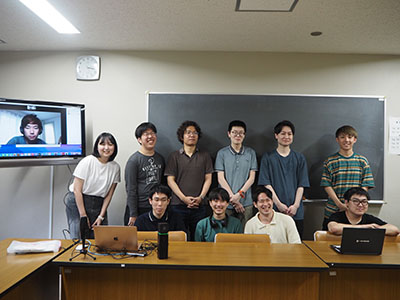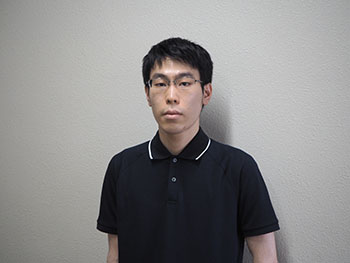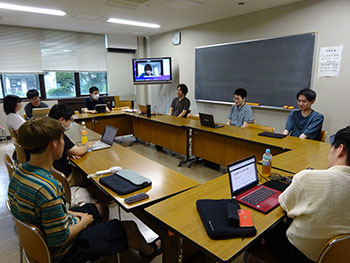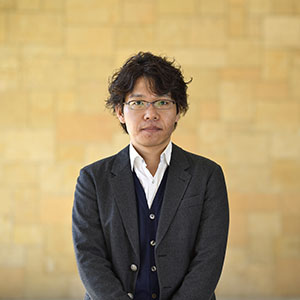Seminar of Associate Professor Masataka Suzuki
Finance : Develop the ability to think and apply, using a mathematical formula

Yoshihide Tani (4th year, Faculty of Commerce and Management) introduces the seminar of Associate Professor Masataka Suzuki (photo: third from left in back row).

a senior in the Faculty of Commerce and Management,
a member of Associate Professor Masataka Suzuki's seminar
I am studying finance in Suzuki Seminar. Specifically, I study the relationship between risk and return in securities investment, the selection of optimal asset combinations (portfolios) based on this relationship, and the pricing mechanism of financial instruments such as stocks, bonds, and options. In the seminar, after learning about the theory through reading textbooks in turn, we have the opportunity to confirm the theory we have learned in practice by using programming (Python) to calculate optimal portfolios from real stock data and to compare theoretical values of options with approximate values.
Although Suzuki Seminar deals with finance, the topics of the graduation thesis are based on the interests of each student and range from those related to ESG investments or corporate governance to those related to accounting, such as the formation of corporate intangible assets. I am doing research on the "impact of shareholder perks on stock prices. I chose this topic not only because I myself invest in stocks and enjoy shareholder perks, but also because I was intrigued by the uniqueness of shareholder perks, which about 40% of listed companies in Japan offer, while few foreign companies offer them. In particular, I am interested in the impact on stock prices of the introduction of “continuous holder” conditions*, which have become more common in recent years. Professor Suzuki has given me advice on hypotheses and verification methods, and I plan to proceed with my research based on this advice.

we introduce the week's topics to each other.
In our seminar, there are many mathematical formulas involved in learning finance, and I think the emphasis on understanding the meaning of these formulas is a unique feature of Suzuki Seminar. Professor Suzuki often asks the question, "How would you explain that in words?" and encourages us to understand the essence. In the seminar, we are expected not to pretend to understand what we do not actually understand. Explanations with ambiguous definitions of words are pursued, but when we genuinely cannot understand something and tell Professor Suzuki about it, he helps us to understand it.
I feel that the seminar fosters the ability to think deeply to understand the essence, an uncompromising attitude, and the ability to communicate one's own ideas in a concise manner. I also think that one of the benefits of this seminar is that by studying finance theory, one can feel more familiar to real market trends and monetary policies.
* “Continuous holder” conditions: A system that provides additional shareholder perks to shareholders who have held shares continuously for a certain period of time or that provides shareholder perks only to such shareholders.

A word to the students
Compared to other management studies, finance often involves mathematical formulas. However, the focus is not on solving formulas to find answers, but rather on how they can be used to interpret economic and management phenomena. Recently, many people with science backgrounds have entered the financial community, but we hope that graduates of the Faculty of Commerce and Management will develop the "ability to think and apply" based on numerical values.
In my seminar, I give them experience in programming as well as management theory. Although it is not a specialized course in information engineering, even just touching the subject before will help them learn quickly, and I believe this experience will be very useful for them to cope with the digital transformation that is taking place in the workplace after they enter the workforce.
The amount of study you can do during your undergraduate years is only 2 or 3 out of 10 as an academic discipline, so I would rather you value the things you can only do while you are a student, such as meeting people and building bonds with your peers. Of course, you are also welcome to pursue the path of a researcher and master the 10.
Associate Professor Masataka Suzuki
He received his Ph.D. in economics from Hitotsubashi University in 2011, and had been a full-time lecturer at the Faculty of Economics, Musashi University, and an associate professor at the Graduate School of International Social Sciences, Yokohama National University before assuming his current position in 2020. His current research interest is “Smooth ambiguity preferences and asset prices with a jump-diffusion process”.
